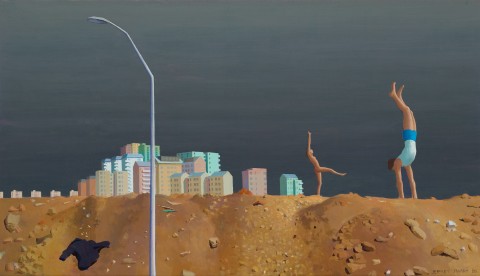CHILDREN PLAYING, 1965
JEFFREY SMART
oil on canvas
40.5 x 70.5 cm
signed and dated lower right: JEFFREY SMART 65
inscribed with title on stretcher bar verso: CHILDREN PLAYING
South Yarra Gallery, Melbourne
James O. Fairfax AC, New South Wales
Paintings and Furniture from the James O. Fairfax Collection, Christie’s, Sydney, 25 October 1994, lot 26
Private collection
Sotheby’s, Melbourne, 28 April 1997, lot 227
Private collection
Sotheby’s, Melbourne, 30 April 2002, lot 30
The Cbus Collection of Australian Art, Melbourne, acquired from the above
Jeffrey Smart, Galleria 88, Rome, 8 – 23 April 1965, cat. 15
Exhibition of Paintings Jeffrey Smart, Macquarie Galleries, Sydney, 29 September – 11 October 1965, cat. 14
Jeffrey Smart, South Yarra Gallery, Melbourne, 19 April 1966, cat. 8
Jeffrey Smart, National Gallery of Australia, Canberra, 11 December 2021 – 15 May 2022 (label attached verso)
on long term loan to Wollongong City Gallery, New South Wales
Gleeson, J., ‘Jeffrey Smart’s “still” lifes’, Sun-Herald, Sydney, 3 October 1965, p. 76
Quartermaine, P., Jeffrey Smart, Gryphon Books, Melbourne, 1983, cat. 438, p. 109
Nainby, B., Stanhope, Z., and Furlonger, K., The Cbus Collection of Australian Art, in association with Latrobe Regional Gallery, Melbourne, 2009, p. 232
Hart, D., and Edwards, R., Jeffrey Smart, National Gallery of Australia, Canberra, 2021, p. 160
We are grateful to Stephen Rogers, Archivist for the Estate of Jeffrey Smart, for his assistance with this catalogue entry.
Although deriving his subject matter from all that would appear disturbing about the modern world – bleak highways, industrial landscapes inhabited by motorised traffic, and an impersonal contemporary architecture that seems unforgiving to human presence – Smart’s paintings are quite assuredly not commentaries upon urban alienation or the human condition. To the contrary, Smart rejoices in the beauty and oddity he perceives within the urban environment, translating momentary glimpses of the everyday into impeccably composed harmonies of colour, shape and line – all imbued with originality, irony and an inescapable feeling of foreboding. Like many of the works featured in Smart’s inaugural (and hugely successful) exhibition in Rome, held at Galleria 88 in April 1965, Children Playing, 1965 draws its inspiration from the ‘city of the soul’ – and more specifically, the deserted, semi-industrial zone near the Villa Torlonia in via Nomentana where Smart was renting an apartment at the time. As Barry Pearce elucidates, it was ‘…a rather fascist-looking area on the outskirts of Rome, but ripe with appeal for painting; no suburbia yet to speak of, blocks of flats adjacent to open agricultural land, a bit of light industry, and scattered sentinels of radio technology breaking the skyline. It was the wondrous landscape of now and the recent past; and for Smart, archetypal.’1
A stunning example from his early years in Italy, Children Playing evokes the enigmatic to brilliant effect, exuding that slightly eerie, expectant quality that is quintessential Smart. Two youths caught in a moment of acrobatic exuberance contrast sharply with the backdrop of immovable, monolithic apartment blocks while above, dark foreboding skies presage a tempest ahead. All elements seem, paradoxically, fixed in ‘stormy immobility’, the air stilled with suspense. As James Gleeson perceptively noted in his review of Smart’s highly acclaimed Macquarie Galleries show in Sydney in 1965 (which included the present work): ‘…In each of the paintings he has chosen to freeze a moment in the story that will be least specific, yet most evocative. He is a narrative painter who deliberately refrains from telling a story Instead he paints a ‘still’ and leaves us to construct a sequence around it – and his ‘stills’ are always enigmatic and capable of many different extensions. Nothing moves in his work… He paints a world of threatened serenity. It combines the satisfactions of stability with the titillating promise of dramatic action.’2 Indeed, so impressed was James Gleeson with Smart’s show that he devoted his entire Sunday feature article to exploring other facets of the enigma that is Smart, concluding '…Smart preserves a façade of objectivity even when he is being his most subjective.’3 Beguiling both the mind and eye, Children Playing exemplifies superbly this uncanny instinct for capturing the most alluring moment of frozen time in the appearance of contemporary life. Like the best of Smart’s achievements, it remains infinitely suggestive yet reveals nothing.
1. Pearce, B., Jeffrey Smart, The Beagle Press, Sydney, 2005, p. 144
2. Gleeson, J., ‘Jeffrey Smart’s “still” lifes’, Sun-Herald, Sydney, 3 October 1965, p. 76
3. Ibid.
VERONICA ANGELATOS
